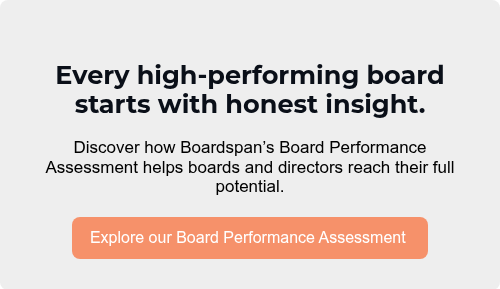Choosing the Right Topics for a Board Evaluation
To evaluate a board effectively, it’s essential to identify the right topics. These topics serve as the foundation for assessing performance, but how do you determine what to evaluate? The key lies in understanding the dimensions that define a great board. These dimensions act as the measuring sticks for performance, offering a clear framework to gauge effectiveness.
Key Dimensions of Board Effectiveness
Composition: The board’s makeup—its size, expertise, and diversity—is a cornerstone of effective governance. Boards that succeed typically:
-
Strike the right balance between agility and representation.
-
Rotate members thoughtfully to maintain fresh perspectives.
-
Combine varied functional expertise with industry insight and diversity to counteract groupthink.
Roles and Responsibilities: Governance shines when directors know their remit. High-functioning boards:
-
Balance oversight with strategic guidance.
-
Provide the accountability that steers management effectively
Communication and Culture: Open dialogue and constructive dissent drive better decisions. Research shows that boards encouraging robust debate tend to outperform their peers. Effective boards:
-
Cultivate trust within the group and with the CEO.
-
Ensure discussions challenge assumptions rather than rubber-stamping decisions.
Information Access: Timely, relevant information is the lifeblood of governance. Boards performing at their peak:
-
Demand comprehensive data that aligns with their strategic priorities.
-
Foster confidence in the transparency and reliability of their information.
Asking the Right Questions: The Heart of Effective Board Evaluations
The questions in a board evaluation questionnaire are more than a formality; they are the key to unlocking actionable insights. The art lies in designing questions that illuminate both strengths and gaps.
Crafting Questions That Matter
-
Specific and Relevant: Questions tailored to the board’s dynamics and priorities reveal actionable insights. Avoid generic or overly procedural queries that provide little value.
-
Balanced Design: Pair quantitative measures, like a Likert scale, with open-ended prompts to capture both hard data and nuanced perspectives.
-
Substance Over Surface: Move beyond checklists to probe the quality of practices. For instance, instead of asking whether the board meets regularly, explore whether those meetings enable sound decision-making.
Common Pitfalls to Avoid
Not all questions will yield useful answers. Here are some to avoid:
-
Overly General Questions: Broad questions like, “Do you feel the board is effective?” often lead to vague answers that lack actionable insights.
-
Leading Questions: Questions that suggest a desired answer, such as “Our board meetings are well-run, aren’t they?” can bias responses and obscure true sentiments.
-
Checklist-Style Queries: Questions that focus on compliance with routine practices (e.g., “Do you receive agendas on time?”) can reduce the evaluation to a procedural exercise, missing opportunities to uncover deeper issues.
-
Overloaded Questions: Asking multiple questions in one, such as, “Do meetings foster collaboration and drive effective decision-making?” can confuse respondents and dilute clarity.
Examples of High-Impact Board Evaluation Questions
-
Does the board’s composition align with the organization’s evolving strategic needs?
-
How effectively does the board promote a culture of open dialogue and constructive dissent?
-
Is the quality and timeliness of information sufficient to fulfill oversight responsibilities?
When thoughtfully constructed, a board evaluation questionnaire provides not only a snapshot of performance but also a roadmap for improvement.
The Right Format and Facilitator: Insights Without Compromise
The method and facilitator of a board evaluation significantly influence its depth and impact. Each approach has merits, but the choice depends on the board’s goals and circumstances.
Comparing Evaluation Formats
-
Questionnaires: These provide a standardized approach, ensuring anonymity and consistency while highlighting patterns across directors’ responses.
-
Interviews: Rich in qualitative detail, interviews offer deeper insights but may lack the candor anonymity provides.
-
Hybrid Models: A combination of questionnaires and selective interviews marries breadth with depth, offering a comprehensive view of board performance.
The Facilitator Factor
-
Internal Leadership: While convenient, internal evaluators, such as your general counsel or nom& gov chair, often struggle with perceived bias or conflicts of interest, which can stifle openness.
-
External Experts: Independent facilitators bring impartiality, experience, and credibility, fostering trust and encouraging honest feedback. Their expertise ensures a rigorous, actionable evaluation process.
Choosing the right mix of format and facilitator can turn a board evaluation into a strategic asset, delivering insights that drive real change.
Conclusion
Board evaluations are both art and science, offering a structured yet insightful view of governance effectiveness. By focusing on meaningful topics, crafting thoughtful board evaluation questions, and selecting the right process, boards can align their efforts with organizational success. A well-executed evaluation doesn’t just assess performance—it inspires improvement.
To transform your evaluation process into a strategic advantage, explore what Boardspan can offer.
The Boardspan Advantage
At Boardspan, we combine cutting-edge digital tools with expert analysis to deliver board evaluations that matter. Our approach includes:
-
Customized board evaluation questionnaires tailored to your unique governance challenges.
-
Anonymized feedback collection to ensure candor and transparency.
-
Expert interpretations that translate insights into actionable recommendations.
Turn evaluations into a platform for governance excellence with Boardspan’s proven solutions.
Recommended Readings on Conducting Board Evaluations
Deepen your understanding with these selected articles from authoritative sources.
Conducting Effective Board Assessments from Harvard Law School Forum on Corporate Governance
Is Your Board Effective? from Harvard Law School Forum on Corporate Governance
Download This Guide
Get a PDF version of this guide.







